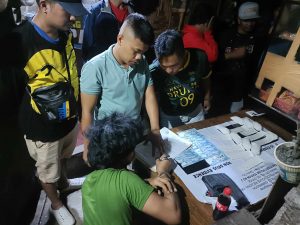 A TOP official said the city is not ready to adopt a more relaxed quarantine status like the Modified General Community Quarantine (MGCQ) as the number of COVID-19 cases has continued to increase.
A TOP official said the city is not ready to adopt a more relaxed quarantine status like the Modified General Community Quarantine (MGCQ) as the number of COVID-19 cases has continued to increase.
Dr. Ashley Lopez, COVID-19 focal person of the city, said over the city government-run Davao City Disaster Radio the expectation on the surge in the number of COVID-19 cases is that it will still be felt next month.
Lopez added that the city is not ready to adopt the newly-released Resolution No. 95 issued by the Inter-Agency Task Force (IATF) on Managing Infectious Diseases last January 21 allowing those between 10 and 65 to go outside of their homes for areas under MGCQ.
“Because as I said, we’re trying to intensify our preventive measures particularly that since January 4, our cases have been increasing,” he said as he pointed out that the number of infections could still reach 100 a day.
“Muhangyo lang ta sa mga katawhan nga although we are so anxious and excited to come out, pero atong sitaution dili pa kaayo safe diri sa Davao City to adapt such new guidleines para ipatuman diri sa atong siyudad,” he added.
Lopez said that although it is under the authority of the IATF to determine the quarantine status of a city, the mayor “has the power to also recommend” what is the course of action is to be implemented in the city.
“Kung ako lang ang pangutan-on, in my own personal opinion, gusto nako unta hinaot samtang nagasaka pa atong kaso mupabilin lang ta og GCQ (General Community Quarantine, the quarantine status of the city at present),” he said.
“As of karon, ang effectivity sa atong GCQ until January 31. Naga-hope lang ko nga unta dili lang ta maglevel – down to MGCQ (Modified GCQ) kay murag lisod pa kaayo tungod sa atong current cases karon diri sa Davao. Daghan daghan pa,” Lopez said.
He added: “Because if you look at the positivity sa Davao, ang threshold man gud anang positivity rate is five percent or less according to WHO (World Health Organization).”
He said that between January 10 and January 24, the positivity rate in the city was still at a high of 11.8%.
Positivity rate is defined as the number of individuals who were found positive of the virus out of those who were tested.
“Which means nga daghan pa kaayo ta og transmissibility or capability of transmission sa atong community,” he said, pointing out that about of the 50% of the cases came from households.
Because of the high positivity rate, he said the city cannot be that confident enough to relaxing its policies which would allow the people to go out of their residences even on non-essential things as they might acquire the virus outside of their homes.
As of January 26, the Department of Health (DOH) – Davao Center for Health Development recorded 67 new COVID-19 cases in Davao Region, 99 from the city, bringing the total number of cases to 11,166 with 1,482 cases.
Based on the same daily report, there were 15 deaths in the region due to the virus, 10 of them from the city, and five from Davao del Norte.
Lopez said the number of deaths on January 26 was the highest recorded number of death on daily basis in the city as the total number of deaths accounted for 4.6% of the total cases.
The city recorded 522 deaths due to COVID-19.




